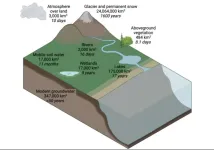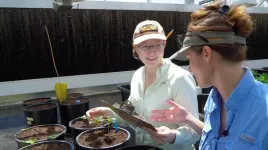(Press-News.org) A series of more than 100 small earthquakes in Surrey in 2018 and 2019 might have been triggered by oil extraction from a nearby well, suggests a new study by UCL researchers.
The earthquakes, which occurred in Newdigate and surrounding areas from April 2018 until early 2019, were recorded as being between 1.34 and 3.18 magnitude, and were linked to cracks in walls and ceilings and other damage to people’s homes, with reports of houses and beds shaking.
Geologists have been divided over whether these earthquakes could have been triggered by extraction at the Horse Hill well in Horley about 5km to 10km away.
Previously, some researchers had argued that the pattern of earthquakes did not correspond to the oil extraction, with periods of increased extraction not followed directly by an increase in seismic activity.
The new study, published in Geological Magazine, ran more than a million simulations estimating the frequency of earthquakes based on the timing and volume of oil extraction and found the model predictions roughly matched what occurred, suggesting a link between the extraction of the oil and the earthquakes.
Lead author Dr Matthew Fox (UCL Earth Sciences) said: “Our study suggests there is a link between the earthquakes and oil extraction at Horse Hill but we cannot rule out that this link is a coincidence. More work needs to be done to understand if this is cause and effect. However, our findings indicate it is plausible that oil extraction triggered the earthquakes.”
Oil extraction at Horse Hill was stopped in October after planning permission was quashed in a landmark legal case. Supreme Court judges ruled that the full climate impact of the project should have been considered before Surrey County Council approved it.
However, another project has received council approval to conduct exploratory oil drilling in Balcombe, West Sussex. This is subject to a legal challenge by a residents’ group, with the case expected to be heard by the Court of Appeal this month [January 2025].*
Extracting oil changes the fluid pressure in the rock the oil is extracted from. This change in pressure can potentially diffuse through tens of kilometres underground to intersect a fault (a shear fracture between two rock blocks). The speed that this change in pressure moves depends on the rock’s permeability (how quickly fluids can pass through it). As faults are often under considerable strain, even a small change in stress can cause the rapid movement of rock that leads to an earthquake.
For the new study, the researchers used a mathematical model to predict the number of earthquakes that might occur based on how much oil had been extracted, accounting for the two different rock types that oil was extracted from.
As much key information is unknown – for instance, what the time lag would be from extracting oil to an earthquake occurring – the team used a Bayesian machine learning tool that randomly varied unknown parameters such as time lag.
Building on the work of the late University of Glasgow geologist Dr Rob Westerway, the researchers were able to account for oil extraction switching between two different rock types, with one, Portland rock, being a million times more permeable than the other, Kimmeridge, meaning the lag time between extraction and a potential induced earthquake would be a matter of days rather than weeks.
Although the earthquakes began just before oil extraction started, the researchers said these earthquakes could have been triggered by preparatory works – for instance, checking the pressure in the well – which could have led to a similar pressure change travelling underground to the fault line.
The researchers said the picture was complicated by the fact that seismometers (instruments detecting ground vibrations) were installed in the area only after the first larger earthquakes had occurred. Any smaller earthquakes that might have occurred prior to these instruments being installed were not recorded. This highlights the need for detailed seismic monitoring before oil extraction begins at proposed sites.
Co-author Professor Philip Meredith (UCL Earth Sciences) said: “Our study highlights the importance of monitoring the seismicity of areas where oil extraction might occur before any works start. Caution should be the byword. It is no good saying you don’t have a problem when you potentially do.
“There has been no significant seismic activity in Surrey for decades, so these earthquakes were unusual events. However, unusual events do happen in nature, so we can’t rule out the possibility that the timing associated with the oil extraction was a coincidence.”
*Lead author Dr Matthew Fox has provided an expert witness statement in the case.
END
Oil extraction might have triggered small earthquakes in Surrey
2025-01-10
ELSE PRESS RELEASES FROM THIS DATE:
Launch of world’s most significant protein study set to usher in new understanding for medicine
2025-01-10
Launch of world’s most significant protein study set to usher in new understanding for medicine
Strict embargo: 00.01 (GMT), Friday 10 January 2025
UK Biobank has today announced the launch of the world’s most comprehensive study of the proteins circulating in our bodies, which will transform the study of diseases and their treatments. This unparalleled project aspires to measure up to 5,400 proteins in each of 600,000 samples, including those taken from half a million UK Biobank participants and 100,000 second samples taken from these volunteers up to 15 years later. This will ...
New study from Chapman University reveals rapid return of water from ground to atmosphere through plants
2025-01-09
Orange, California - January 9, 2025: A new study led by scientists in the Schmid College of Science and Technology at Chapman University provides the first comprehensive global estimates of the amount of water stored in Earth’s plants and the amount of time it takes for that water to flow through them. The information is a missing piece of the puzzle in understanding the global water cycle and how that cycle is being altered by changes in land use and climate.
The study, published today, January 9, in the journal ...
World's darkest and clearest skies at risk from industrial megaproject
2025-01-09
On December 24th, AES Andes, a subsidiary of the US power company AES Corporation, submitted a project for a massive industrial complex for environmental impact assessment. This complex threatens the pristine skies above ESO’s Paranal Observatory in Chile’s Atacama Desert, the darkest and clearest of any astronomical observatory in the world [1]. The industrial megaproject is planned to be located just 5 to 11 kilometres from telescopes at Paranal, which would cause irreparable damage to astronomical observations, in particular due to light pollution emitted throughout the project’s operational life. Relocating the complex would save one ...
UC Irvine-led discovery of new skeletal tissue advances regenerative medicine potential
2025-01-09
Irvine, Calif., Jan. 9, 2025 — An international research team led by the University of California, Irvine has discovered a new type of skeletal tissue that offers great potential for advancing regenerative medicine and tissue engineering.
Most cartilage relies on an external extracellular matrix for strength, but “lipocartilage,” which is found in the ears, nose and throat of mammals, is uniquely packed with fat-filled cells called “lipochondrocytes” that provide super-stable internal support, enabling ...
Pulse oximeters infrequently tested by manufacturers on diverse sets of subjects
2025-01-09
Manufacturers increasingly but still infrequently follow Food and Drug Administration guidance that recommends testing pulse oximeters on participants with a range of skin pigmentations, according to a new study led by researchers at the Johns Hopkins Bloomberg School of Public Health.
The FDA made the recommendation in 2013, following reports that pulse oximeters—devices that measure blood-oxygen levels by shining light through the skin—can be less accurate when used on people with dark skin and that undetected low oxygen levels are more common ...
Press Registration is open for the 2025 AAN Annual Meeting
2025-01-09
MINNEAPOLIS – Press registration is now open for journalists who wish to attend the 77th Annual Meeting of the American Academy of Neurology (AAN). The 2025 AAN Annual Meeting will be held from April 5-9 in San Diego and online.
The AAN Annual Meeting brings together thousands of neurologists and neuroscience professionals, offering the latest in scientific discoveries and advances in neurological research. There will be over 3,200 abstracts covering 25 neurology topics and specialties. The meeting will include late-breaking research, key lectures and more than ...
New book connects eugenics to Big Tech
2025-01-09
Anita Say Chan, an associate professor in the School of Information Sciences at the University of Illinois Urbana-Champaign, has authored a new book that identifies how the eugenics movement foreshadows the predatory data tactics used in today's tech industry. Her book, Predatory Data: Eugenics in Big Tech and Our Fight for an Independent Future, was released this month by the University of California Press.
Over a century ago, the eugenics movement sought to eliminate "undesirable" traits in society through selective breeding (sterilization). It was biased against marginalized groups ...
Electrifying your workout can boost muscles mass, strength, UTEP study finds
2025-01-09
EL PASO, Texas (Jan. 9, 2025) – If building strength and muscle mass is part of your New Year’s Resolution, you may want to add a new routine to your workout.
Neuromuscular electrical stimulation (NMES), or electrical muscle stimulation for short, uses electrical currents to contract muscles. The stimulation devices are easy to use and widely available on the market, according to Sudip Bajpeyi, Ph.D., a professor in the Department of Kinesiology at The University of Texas at El Paso, but he has often wondered, “Can these stimulators offer ...
Renewed grant will continue UTIA’s integrated pest management program
2025-01-09
The University of Tennessee Institute of Agriculture (UTIA) has received a $210,000 grant from USDA’s National Institute of Food and Agriculture (NIFA) to support ongoing integrated pest management (IPM) programs across Tennessee.
An environmentally sensitive approach to pest management that emphasizes affordability and long-term sustainability, IPM practices have been implemented statewide courtesy of UT Extension specialists in fields such as agronomy, weed management, entomology, plant pathology, soil health and pesticide education. The recently ...
Researchers find betrayal doesn’t necessarily make someone less trustworthy if we benefit
2025-01-09
Key takeaways
Both intuition and past research suggest that whether people deem someone trustworthy depends on that person’s past behavior and reputation for betrayal.
In a series of experiments, psychologists found that subjects regarded those who previously exhibited that behavior as less trustworthy. However, when the betrayal benefited them or had no effect on them, participants regarded the betrayer as trustworthy.
This pattern was largely consistent across the types of relationships studied: friendships, romantic relationships and professional relationships.
Imagine this scenario: Two people cheat on their partners with each other ...




